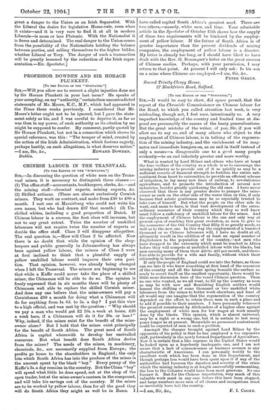[TO THE EDITOR OF VIE "SPECTATOR:9
Silt,—In discussing the question of white men on the Trans- vaal mines, it is necessary to distinguish three classes :— (1) The office staff—accountants, bookkeepers, clerks, &c.—and the mining staff—chemical experts, mining experts, &c.
(2) Skilled artisans. (These are almost exclusively Cornish miners. They work on contract, and make from £40 to £80 a month. I met one at Maraisburg who could not write his own name, but who had drawn £87 that month.) (3) Un- skilled whites, including a good proportion of Dutch. If Chinese labour is a success, the first class will increase, but not to any great extent. Twice the number of unskilled labourers will not require twice the number of experts or double the office staff. Class 3 will disappear altogether. The real question is,—How will Class 2 be affected. Now there is no doubt that while the opinion of the shop- keepers and public generally in Johannesburg has always been against yellow labour, the miners of Class 2 were at first inclined to think that a plentiful supply of yellow unskilled labour would improve their own posi- tion. That opinion, however, was already being changed when I left the Transvaal. The miners are beginning to see that while a Kaffir could never take the place of a skilled miner, the Chinaman will be able to do so. The opinion is freely expressed that in six months there will be plenty of Chinamen well able to replace the skilled Cornish miner. And does any one believe that the mine-owners will pay a Cornishman £80 a month for doing what a Chinaman will do for anything from ls. 6d. to 5s. a day ? I put this view to a high official, and was met by the question : " Why should we pay a man who would get £2 102. a week at home, £20 a week here, if a Chinaman will do it for 30s. or less ? " Why, indeed, if the mines exist for the benefit of the mine- owner alone ? But I hold that the mines exist principally for the benefit of South Africa. The great need of South Africa is capital wherewith to develop her unrivalled resources. But what benefit does South Africa derive from the mines ? The needs of the mines, in machinery, chemicals, &c., are necessarily supplied from Europe ; the profits go home to the shareholders in England ; the only bite which South Africa has into the produce of the mines is the amount spent by the black " boy." Every penny of the Kaffir's 3s. a day remains in the country. But the China " boy" will spend what little he does spend, not at the shop of the open trader, but at the mine-owner's canteen in the compound, and will take his savings out of the country. If the mines are to be worked by yellow labour, then for all the good they will do South Africa they might as well be in Essex. I
have called capital South Africa's greatest need. There are two others,—namely, white men, and time. Your admirable article in the Spectator of October 15th shows how the supply of these two requirements will be hindered by the employ- ment of yellow labour. If the future of South Africa is of greater importance than the present dividends of mining. companies, the employment of yellow labour is a disaster.' My letter is already too long, or I should have liked to have dealt with the Rev. G. Bosanquet's letter on the great success of Chinese coolies. Perhaps, with your permission, I may return to that point. At present I will only ask : Is his sou on a mine where Chinese are employed.—I am, Sir, &c.,
PETER GREEN.
27 Blackfriars Road, Salford.
[To THE EDITOR OF THE "SPECTATOR."










































 Previous page
Previous page